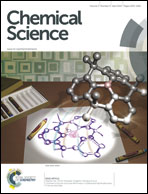A quantitative and site-specific chemoenzymatic glycosylation approach for PEGylated MUC1 peptides†
Abstract
Full control over complex post-translational modifications (PTMs), such as O-glycosylation, is a prerequisite for testing and understanding the biological role of these modifications in protein function. Despite considerable progress over the last years, high throughput and easy-to-use methods for the synthesis of complex glycosylated peptides are still missing. We present here an efficient methodology to produce homogeneous site-specifically O-glycosylated peptides. Sequential chemoenzymatic glycosylation and separation from the reaction components are achieved via the temporary attachment of a monodisperse polyethylene glycol (PEG) polymer to the N-terminus of these peptides. Subsequent proteolytic removal of the PEG moiety allows quantitative recovery of homogeneous O-glycopeptides, suitable as building blocks for glycoprotein synthesis. Here, we demonstrate the preparation of glucuronylated variants of MUC1, a well-known member of the human mucin family. Homogeneously O-glycosylated variants were synthesized and will be used to study the role of O-linked glucuronic acid epitopes within the functional environment of the human MUC1 tandem repeat.


 Please wait while we load your content...
Please wait while we load your content...